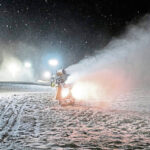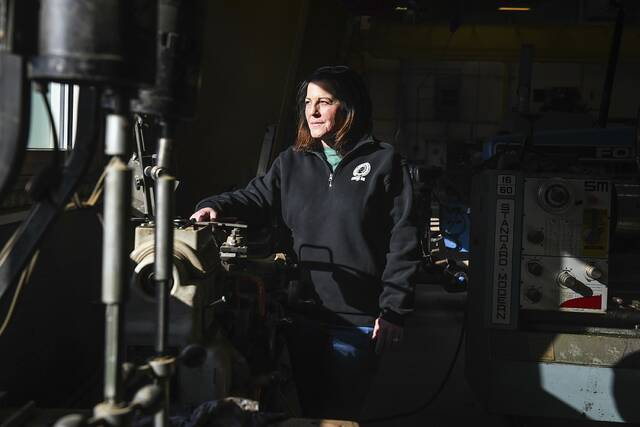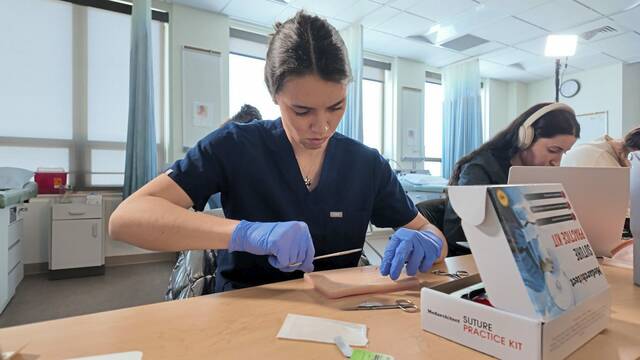On Friday, the National Weather Service in Pittsburgh issued an advisory for 2 to 4 inches of snow Saturday in eastern Preston and Tucker counties in West Virginia.
It’s something meteorologists there haven’t had to do often.
This year is on track to be the second-least snowy year on record for Pittsburgh since 1880. For calendar year 2023, there have been just 13.1 inches of snow — 2.2 inches above the record low of 10.9 inches in calendar year 1998.
Between 1991 and 2020, Pittsburgh averaged 44.1 inches of snow per year.
In 2023, only 1.7 inches of snow has been measured during the current winter season, with the other 11.4 inches falling earlier in the year, between January and March.
Measurements are taken at Pittsburgh International Airport. No substantial snow is in the forecast for the remainder of the year, the weather service said.
It’s all thanks to El Nino, which, meteorologist Lee Hendricks said, has been affecting the region’s weather for two years.
Generally, the El Nino effect comes from abnormally warm sea surface temperatures along the equatorial Pacific, Hendricks said. The opposite, La Nina, occurs with abnormally cool sea surface temperatures generally in the western Pacific.
“What that usually means for our area is not only relatively dry weather but also relatively mild temperatures,” he said.
1)Good Morning! No changes made overnight to the ongoing Winter Weather Advisory for eastern Preston and Tucker counties, where up to 4" will be possible. Rain/snow overall has been light so far but should see a slight bump up in coverage over the course of the morning. pic.twitter.com/OO8A5FFNAi
— NWS Pittsburgh (@NWSPittsburgh) December 30, 2023
Beyond snow, total precipitation is 6.79 inches below normal for the year. Nine months this year saw below normal precipitation, while only three — January, July and December — registered above normal by any measure.
This month, the precipitation came primarily on three days — Dec. 3, 17 and 27, Hendricks said.
Snowpack is needed to keep the region’s reservoirs at reasonable levels, Hendricks said. But the outlook for the first quarter of 2024 does not bode well, with above normal temperatures and below normal precipitation expected.
Officials with the Municipal Authority of Westmoreland County blamed a lack of rain and snow for falling water levels at its Beaver Run Reservoir, which triggered a mandatory conservation order for more than 56,000 of the authority’s customers this month.
Snow amounts can vary wildly across the region.
Seven Springs Mountain Resort in Somerset County received 18 inches of natural snowfall this winter, said Brett Cook, vice president and general manager of Seven Springs, Hidden Valley and Laurel Mountain.
“We love a good natural snowstorm, but we can make our own at Seven Springs, Hidden Valley and Laurel Mountain,” Cook said. “We kicked off snowmaking at Seven Springs and Hidden Valley right after Thanksgiving and a few days later at Laurel Mountain.”
What’s on the slopes now is all machine-made snow. Machine-made snowflakes are smaller and denser than natural ones, Cook said.
According to Cook, all three resorts have an 18-inch snow base. Seven Springs has 13 slopes and trails, Hidden Valley has five slopes and trails, and Laurel Mountain has four slopes and trails.
If even machine-made snow could be more widespread, that might be helpful to retailers such as Busy Beaver in New Kensington, where sales manager James Clark said they have pallets of shovels, salt and calcium chloride available.
“I got a ton,” he said. “We had them out before Thanksgiving.”
People are buying some supplies, perhaps to be ready just in case, but Clark said they’re taking the smaller bags, not the 50-pound ones.
“We’re ready and willing to sell,” he said. “If they want to come in, we’ll take care of them.”
PennDOT also has plenty of salt on hand. District 11, which covers Allegheny, Beaver and Lawrence counties, has more than 60,000 tons, spokesman Steve Cowan said.
“The five-year average of winter salt usage is approximately 50,000 tons of salt a year in our district,” he said.
A first good snowfall often triggers cars lining up around the block to get snow tires at Highland Tire in Tarentum. Light winters a few years in a row have evened out those spikes, manager Harry Hoffman said.
“We’ve seen some people maybe choosing to go with an all-season tire instead of a straight winter tire,” he said.
Highland Tire has snow tires available, as they were ordered earlier in the year before it was known what kind of winter would hit, Hoffman said.
Despite the lack of snow, Hoffman said, they’ve sold quite a few snow tires, and he still recommends them.
“Winter tires give twice the traction of all-seasons,” he said. “Regardless of whether there’s snow on the ground or not, you know it’s going to snow at some point.”
Well, if history is any indication, anyway.











